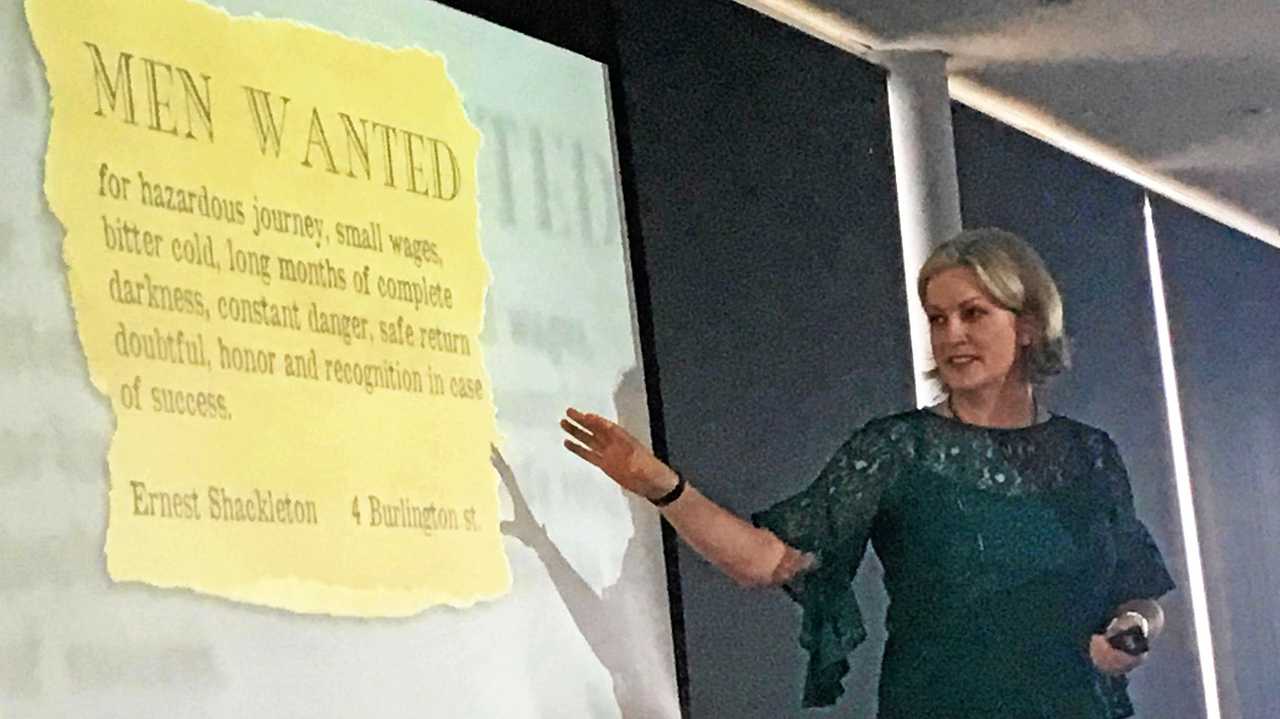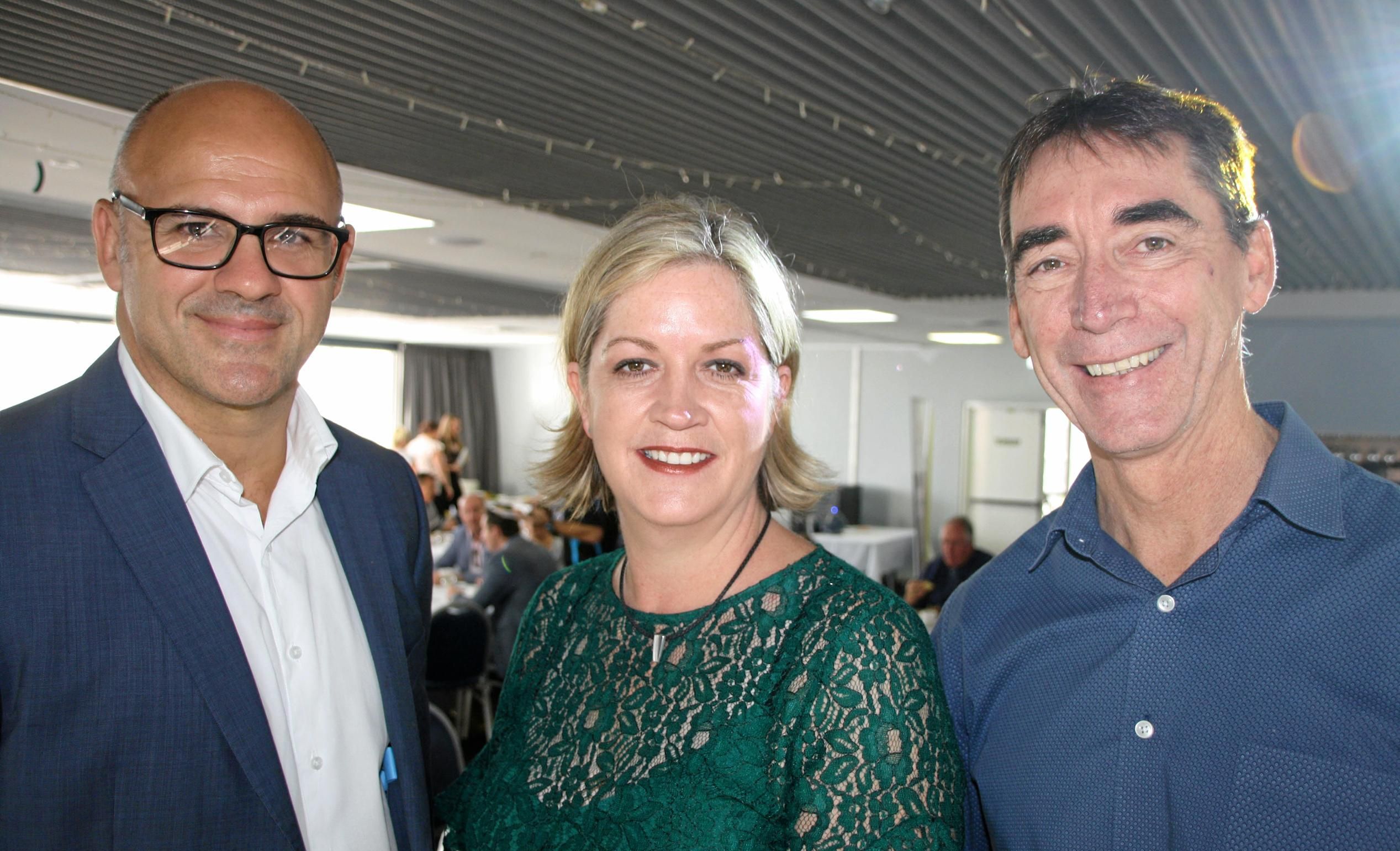Extreme adventure breaks ice on integrity
ACCIDENTAL leader shares Antarctic role and lessons learned with Coast real estate group.

Business
Don't miss out on the headlines from Business. Followed categories will be added to My News.
​RACHAEL Robertson describes herself as the accidental leader. Yet there was nothing accidental about her success in leading a team in one of the most extreme environments on Earth. Antarctica.
Months of living in 24 hours of darkness in close quarters with a team of 18, and to stick with them until the supply ship returns 12 months later.
"How do you make that fun?'' the second woman to lead an expedition to the frozen continent asked at a Ray White breakfast at Maroochydore. "That experience is something that will stay with them for the rest of their life.''
Ms Robertson led the 58th Australian National Antarctic Research Expedition to Davis Station in 2005. Her current work of speaking, writing and mentoring is based around the leadership lessons she learned in what she terms as "the world's most extreme workplace.''
Just like legendary Antarctic explorer Edmund Shackleton did in the early 1900s, the role of expedition leader was advertised in a newspaper.
"I was flicking through and saw a penguin ... in the career section,'' she told the breakfast meeting.
"Resilience, empathy, integrity. They were the qualities needed for the job.
"You can learn the technical aspects of real estate in time, but you need those qualities to start.''
At the time of applying for the Antarctic role Ms Robertson was in customer service and simply wanted to get to the job interview. This was so she could get the questions and apply them to her own situation.
When they eventually asked if she wanted the role that led to a moments hesitation.
"They didn't have an interview, they have a week-long boot camp in Tasmanian highlands.
"One day we had to hike 21km with someone on a stretcher. Then hike back, only to be told on arrival we had 10minutes to get ready for the interview.
"They asked if I wanted the role. I said I could not answer straight away.
"But I soon realised I did not want to regret what I didn't do.''
It was not until the group was getting ready for fire training that the full impact of what she had signed up for hit her.
"I thought, no, I signed up for a leadership role, not a firefighter. But then realised I had signed up as leader. I needed to step up.
"That second, when crawling through a smoke-filled shipping container, I became an
accidental leader.''
Aboard the Aurora Australis, Ms Robertson found out the hard way why an icebreaker is designed to ride above the waves, not stabilised for a smoother voyage.
"It was like a washing machine effect for two and a half weeks as she crashed through 11m swells.''
The ship makes that passage twice a year with 120 on board ... scientists doing ice coding biology, also tradespeople and a cargo of food, equipment, materials, medicine and clothes.
It takes the summer team back to Australia and leaves the winter team of 18 there to keep the lights on, keep the place warm.
There is no hospital. Fremantle is 4000km away ... and nine months waiting for the next ship.
For four months it is pitch black so the focus is on each other.
"They can tell you about all the Antarctic stuff, like walking around outside in a blizzard when its 35degrees below. They cannot teach you leadership.
"What that role taught me was every job has an Antarctic winter. It's just work.
"To keep the team together, find a reason to celebrate.
"Those days turns moments into momentum.''
As for integrity, it is found in a lot of different ways.
"The secret is to have no triangles. If there is an issue go direct to that person, not a third party.
"The number one rule was respect. If you strive for harmony you are in trouble ... the issues go underground.
"You need to develop integrity within the team.
"Collaboration. You learn that in an Antarctic winter. Protect the tribe so the individual remains safe. Just like the Emperor penguins work together to keep the team strong.''
After a plane crash, four or five of the team were stranded 500km away. They had enough food for 10 days.
When six of those still at the base went out on search and rescue, it taught her that leadership was not a title, it's seeing something needing to be done and doing it.
"You can lead without a title. If you have a good idea, bring it. We got them back on day five.''
Another lesson Ms Robertson learned was to look after the little things. Like washing up your own coffee cups.
"Otherwise that shows a lack of respect. It implies my time is more important.
"Exercise helps you sleep well and be more resilient. My time management was not an issue, it was knowing my boundaries.
"I thought being a good leader meant I had to be there. But you can do more damage by not prioritising.
"The language you use, especially when times are tough, is so important. Knock out these words: no, everyone, I, never, always and a bad idea.
"Take the emotion out. Stick to the facts. You cannot argue with that.''
SHACKLETON IN ANTARCTICA
Men wanted for a hazardous journey, small wages, bitter cold, long months of complete darkness, constant danger, safe return doubtful, honor and recognition in case of success. Ernest Shackleton, 4 Burlington St
The newspaper advertisement by Shackleton said it all. The acclaimed explorer went to the Antarctic three times including Captain Robert Scott's attempt on the South Pole 1901-1904.
During the second expedition 1907-1909 he and three companions established a new record Farthest South latitude at 88°S, 180km from the South Pole.
But it was Shackleton's attempted crossing of Antarctica in 1914-17 from sea to sea, via the pole, that stands out.
Disaster struck this expedition when its ship, Endurance, became trapped in pack ice and was slowly crushed before the shore parties could be landed.
The crew eventually escaped by camping on the pack ice and then launching the lifeboats to reach Elephant Island and ultimately the inhabited island of South Georgia, a stormy ocean voyage of 720 nautical miles and Shackleton's most famous exploit.
Originally published as Extreme adventure breaks ice on integrity







